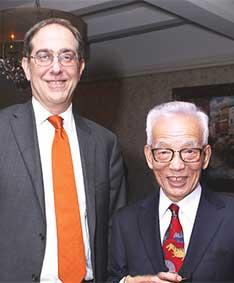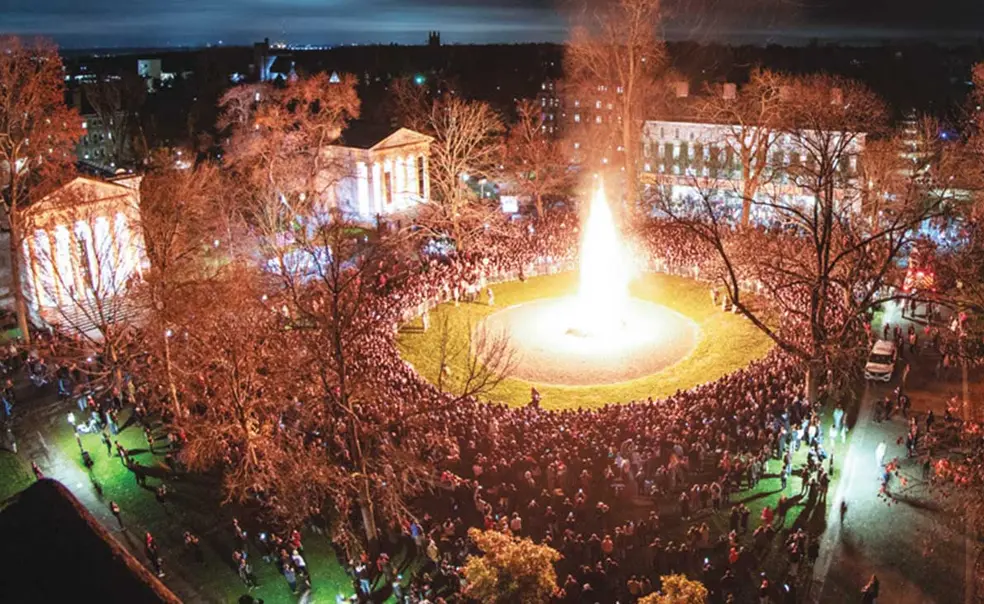Persistence and Celebration
My predecessor, Shirley Tilghman, once remarked to me that scientists had to be optimists because they needed to believe that experiments that failed yesterday would, with the right improvements, work today. Her point applies far more broadly, I think. Persistence and optimism are fundamental to the mission of colleges and universities.
Our scholars and students must believe that archival investigations that discovered nothing yesterday will succeed today; that conceptual puzzles unsolved yesterday will yield their secrets today; and that paragraphs that flopped yesterday will soar today. And they must believe that months, years, and sometimes decades of study will ultimately produce something meaningful and perhaps fabulous despite the repeated skepticism of those who ask, “What on earth is the value of that?”
Persistence is hard. It benefits tremendously from the campus rituals and gatherings that nourish our spirits and inspire optimism even on days when success seems distant or elusive. The pandemic has been difficult not only because of the burdens it has imposed, but also because it has deprived us of many occasions that could fortify our ability to persist through those challenges.
I am accordingly grateful that the fall semester afforded us several rare and special opportunities to celebrate as a community.
In October, the Nobel committees favored Princetonians with an astonishing five Nobel prizes. Suki Manabe, of the Program in Atmospheric and Oceanic Sciences and the Geophysical Fluid Dynamics Laboratory, won the Nobel Prize in physics for curiosity-driven research that created the field of climate modeling in the 1960s. Another faculty member, David MacMillan of the Department of Chemistry, won for far more recent research on catalysis—research that has rapidly generated practical applications for multiple industries.
An undergraduate alumna, Maria Ressa ’86, who concentrated in English and earned a certificate in theater, became the second Princetonian to win the Nobel Peace Prize (Woodrow Wilson, Class of 1879, was the first, in 1919). Two graduate alumni, David Card *83 and Joshua Agrist *89, won the Nobel Prize in economics for their work on empirical methods and labor markets.
This combination was amazing not only for the sheer number of awards but also because they illustrate so many aspects of the University’s mission, including our commitments to excellence in faculty research, undergraduate education, graduate education, environmental science, innovation, the liberal arts, service to the nation and humanity, and policy-relevant social science.
Nobel Prizes provide unique opportunities for celebration by entire academic departments and scholarly communities who rejoice at seeing the world take note of what they do.

In late November, for example, I attended a dinner honoring the 90-year-old Dr. Manabe. Attendees included former students and scientific collaborators from throughout his life, current students and faculty, and leading officials from the United States Department of Commerce and the National Oceanographic and Atmospheric Administration, the government sponsors of the Geophysical Fluid Dynamics Laboratory.
One speaker described how, when he was a young researcher, one of his climate models failed miserably. He shared it with Suki, who said, in effect, “That’s great work; we’ve learned something.” Now, after all the moments when progress seemed slow, Suki’s prize demonstrated that the hard work, the persistence, and the optimism had indeed mattered—and that the entire world knew it.
I sometimes think that Nobel Prize celebrations are for Princeton what national athletic championships are on some other college campuses. But, of course, extracurricular activities, including competitive athletics, also play an essential role in this University’s educational mission.
So it was, that four days after delivering remarks at Dr. Manabe’s banquet, I spoke again at a very different event when Princeton’s Ivy League championship football team lit a bonfire on Cannon Green to mark its victories over Harvard and Yale. It felt like the entire campus was on hand for the festivities.
Winning championships, too, requires determined persistence through obstacles and challenges, especially for students who had to cope with cancelled seasons and remote classes. The bonfire provided an occasion for all our students to celebrate their return to campus and what they had achieved by pressing onward through the pandemic. “Let the lighting of this bonfire be the ultimate re-ignition of community,” urged Undergraduate Student Government President Christian Potter ’22.
That spirit of community matters. As I write these words, the world is just beginning to cope with the Omicron variant. I am heartened that Princeton confronts it strengthened not only with a battery of vaccines, PCR tests, and antivirals, but also with the animated energy of Tigers on campus and throughout the world.












No responses yet